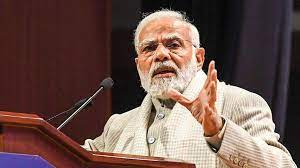PM Applauds Theatre Festival Highlighting Arunachal’s History
The “Arunachal Rang Mahotsav,” a four-day theater festival organized throughout the nation to bring the little-known history of Arunachal Pradesh to a larger audience, was praised by Prime Minister Narendra Modi on Wednesday.
Tuesday marked the start of the festival’s last phase at the Srimanta Sankardeva International Auditorium in Guwahati, Assam.

“Arunachal Rang Mahotsav is a celebration of the rich cultural heritage of Arunachal Pradesh, and it is more than simply a program. It is consistent with Ek Bharat Shreshtha Bharat’s guiding principles, Modi said in a post on X, previously known as Twitter.
Pema Khandu, the chief minister of Arunachal Pradesh, had put a statement on X, and Modi shared it. He commented, “Good to see this programme being held in different parts of India including Delhi, Mumbai, Kolkata, and Guwahati.”
Four plays were staged in each city to dramatize the rich history of Arunachal Pradesh. Starting on July 18, the event was hosted for four days each in Delhi, Mumbai, and Kolkata.
“Our history classes never discussed our heroes, who made significant contributions to the fight for freedom against the
British control.
However, a number of epic stories of our warriors were discovered, owing to the efforts of our local researchers. We are pleased that tales of bravery, fortitude, and sacrifice by our unsung heroes of Arunachal Pradesh will now be told to the next generation, Khandu remarked.
He conveyed his appreciation to Assam Chief Minister Himanta Biswa Sarma for attending the program’s first day in Guwahati.
on Tuesday, ati.
In his speech, Khandu said that Assam and Arunachal Pradesh “share a common history and glimpses of it were showcased through the play, ‘Chowpha-Plang-Lu,’ that narrated the Tai Khamti rebellion of 1839.”
X handle for cial.
One of the bravest efforts undertaken on the Eastern boundary of the Indian subcontinent was the Khamti tribe’s struggle against the British army in 1839.
The other three plays are “Arunachal Ek Safarnama,” “Poju Mimak,” and “Ninu 80” in addition to “Chowpha-Plang-Lu.”
“Due to a lack of adequate documentation, the world is still unaware of our rich past. Even we, the locals, are uninformed of significant historical occurrences that took place in our country, said Khandu.
Riken Ngomle, an assistant professor at the National School of Drama, directed the plays.







